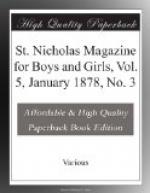“Mercury is carried in sheepskin bags and cast-iron bottles. It is so heavy that an ordinary cork would soon be forced out by it, therefore an iron stopper must be screwed in.
“Once, some bags of mercury were stored in the hold of a foreign vessel; unfortunately, a few of the bags were rotten and leaked. Every person on board was poisoned, and every piece of metal connected with the vessel received a silvery coating of mercury.”
“It is dreadful! Fred, don’t let us touch it,” said Harry.
“Don’t be frightened yet, Harry. Did you know that mercury is used as a medicine? It is given in very small doses.”
“I am sure I shall never take it,” exclaimed Fred.
“Perhaps you may have done so already,” replied their grandfather, laughing. “Did you ever hear of blue-pill and calomel? They both are preparations of mercury.”
Just then the sun shone into the room so brightly that every one turned to the windows. Such a sparkle! The evergreens were covered with shining ice-drops, and the tall trees pointed their glistening branches toward the few clouds that were hurrying over the blue sky.
“I am not sorry it rained, after all,” said Fred. “I have enjoyed the morning so much that I forgot the play we were going to have.”
Two happy, tired boys went to sleep that night, and the next morning they started for home. They both agreed in thinking they had never enjoyed a more delightful visit at grandpapa’s.
THE WOODS IN WINTER
There is scarcely any place so lonely as the depths of the woods in winter. Everything is quiet, cold and solemn. Occasionally a rabbit may go jumping over the snow, and if the woods are really wild woods, we may sometimes get a sight of a deer. Now and then, too, some poor person who has been picking up bits of fallen branches for firewood may be met bending under his load, or pulling it along on a sled. In some parts of the country, wood-cutters and hunters are sometimes seen, but generally there are few persons who care to wander in the woods in winter. The open roads for sleighing, and the firm ice for skating, offer many more inducements to pleasure-seekers.
But young people who do not mind trudging through snow, and walking where they must make their own path-way, may find among the great black trunks of the forest trees, and under the naked branches stretching out overhead, many phases of nature that will be both new and interesting—especially to those whose lives have been spent in cities.
[Illustration: THE WOODS IN WINTER.]
CRUMBS FROM OLDER READING.
II.
BY JULIA E. SARGENT.
IRVING.
Washington Irving has so many things for us, and we have heard so much that is pleasant of him, that a good time with him may be expected; and you would not read far in Irving’s books before learning that no one believed in “good times” more than he. The name of his home on the Hudson would tell you that. “Sunnyside” is not the name a gloomy man would choose.




